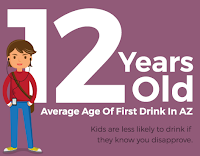By Samuel Burba, Interim Director of the Governor’s Office of Youth, Faith and Family
Several years ago, I read a statistic that will always stick with me in my profession and as a parent.
Seventy three percent of youth say that school stress is the primary reason they use drugs while only seven percent of parents believe their child would use drugs to cope with stress. The disconnect between parents and youth on this point is sobering. If we as parents can help our children understand healthy levels of stress and healthy coping strategies, we will go a long way in helping them avoid negative and risky behaviors such as the early onset of substance use.
Just like adults, youth face different levels and types of stress at different points in life. For youth, a significant amount of stress may come at high-risk periods in their life. These key risk periods often occur during major transitions which may include moving to a different school, facing new social and academic challenges or changes in a family dynamic. To complicate the issue of stress, our children hear a myriad of ways to self-medicate stress, many of which end up causing more stress.
Underage drinking, marijuana, and prescription drug use are significant issues for Arizona youth and for parents who are struggling to communicate with them about the potential dangers. In fact, the average age youth first try alcohol and drugs is 12 to 13.
Knowing our youth are at a vulnerable point in their life, it’s important for us, as their role models, to help them develop proper coping strategies and keep them from turning to unhealthy coping mechanisms such as substance use.
Here are some simple ways parents can work with their children to develop healthy coping strategies:
Communicate —Youth need ongoing positive communication with their parents or guardians. It is estimated that having ongoing talks with children about drugs and alcohol can reduce the risk of youth drug use by 50 percent. Yet in Arizona, only 51 percent of youth report ever having these conversations. Every talk does not need to be about drugs and other risky behavior, but we want to create a consistent expectation of having open and honest dialogue with our children.
One strategy that helps in setting this expectation is having tech-free time every night. While it may be uncomfortable at first, this intentional time naturally leads to conversation. Consider using conversation starters over a family dinner and ask open-ended questions about each person’s day. If a conversation ever becomes too intense, it is actually healthy to take a break and set a time to come back and finish the conversation after everyone has had time to cool down. By modeling healthy communication, we are teaching our children one of the most important coping strategies and life skills.
Be intentional about spending time with your children — By spending intentional, uninterrupted time, we are communicating we love, care about and want an ongoing relationship with our children. Consider spending 15 minutes a day, an hour a week and one to two uninterrupted days a year with each child. This time spent together helps build a positive relationship between parent and child and allows for trust to be established. Never underestimate how important it is for your child to know you are in their corner and enjoy their company. Parents can find a list of low to no-cost activities to do with their child on OvercomeAwkward.org.
Create time for your child to de-stress and relax — While it is important for youth to be involved in school, extra-curricular activities and spending time socializing, it is equally important for parents to create a safe place and time for children to disconnect. Many children become overloaded with all the activities and social pressure throughout the day. Having a time and place to safely de-stress is critical for youth in a day-and-age when they are always “plugged-in.” Activities can be as simple as journaling, playing music, reading a book, healthy exercise or exploring a new hobby. The key is they can spend intentional time just being themselves.
Establish consistent, obtainable family expectations — It is stressful for anyone, let alone youth, when we do not know what is expected of us. Imagine working in an environment in which you never knew what was expected of you or if you are doing a good job. In a similar way, families need consistent and clearly stated values and expectations. One of the best ways to form this consistent foundation for your family is by developing a family prevention plan.
Consider taking time with the leaders of the household (adults) to clearly articulate and write out the core family values and develop strategies for upholding those values on a consistent basis. The purpose is never to entrap anyone or to make expectations on the family or child that are unobtainable.
Review the plan as a family, listening to each family members thoughts and input. Post or place the plan where everyone can see it to serve as a constant reminder. Remember, a prevention plan is an ongoing, living document for the family, so revisit the plan every six to twelve months to see if it needs to be modified.
You can find a family prevention plan template at OvercomeAwkward.org
Recognize signs of stress — When is the last time you asked your child what stresses them out and actually listened? Youth will tell us what their stress is, but we usually don’t ask them and listen without trying to solve their problems or becoming defensive. The truth is, as parents, our role has never been to eliminate stress from our child’s life. Our role is to understand their stress, intervene in negative behaviors and help them identify healthy coping strategies. With that said, there are times that youth will not be able to healthily cope with stress and we, as parents, will need to intervene. For example, bullying, negative peer influence, risky behaviors, substance use, etc. The more we seek to understand or child’s stress the more equipped we will be to know when it is time to intervene.
Warning signs in kids often look like normal adolescent development: withdrawal from family and friends, drop in grades, pushing against family rules or unwillingness to talk. The sooner you identify signs of stress or other negative behaviors, the sooner you can come alongside and better support your child.
Identify community support systems – The beautiful thing about community is that it means families are never truly alone. It is good for our youth to have monitored and positive relationships with adult role models and mentors such as coaches, school teachers or pastors. Ideally, these people will help reinforce family values and give youth perspective on difficult situations. The more the family can be active in a healthy community, the more our youth are protected and likely to grow into the individuals they want to be rather than having their future radically altered because of a series of negative choices.
Samuel Burba is the Interim Director of the Governor’s Office of Youth, Faith and Family. The Governor’s Office of Youth, Faith and Family aims to create a brighter future for youth and families by providing Arizona with programming, resources, and expertise.


































